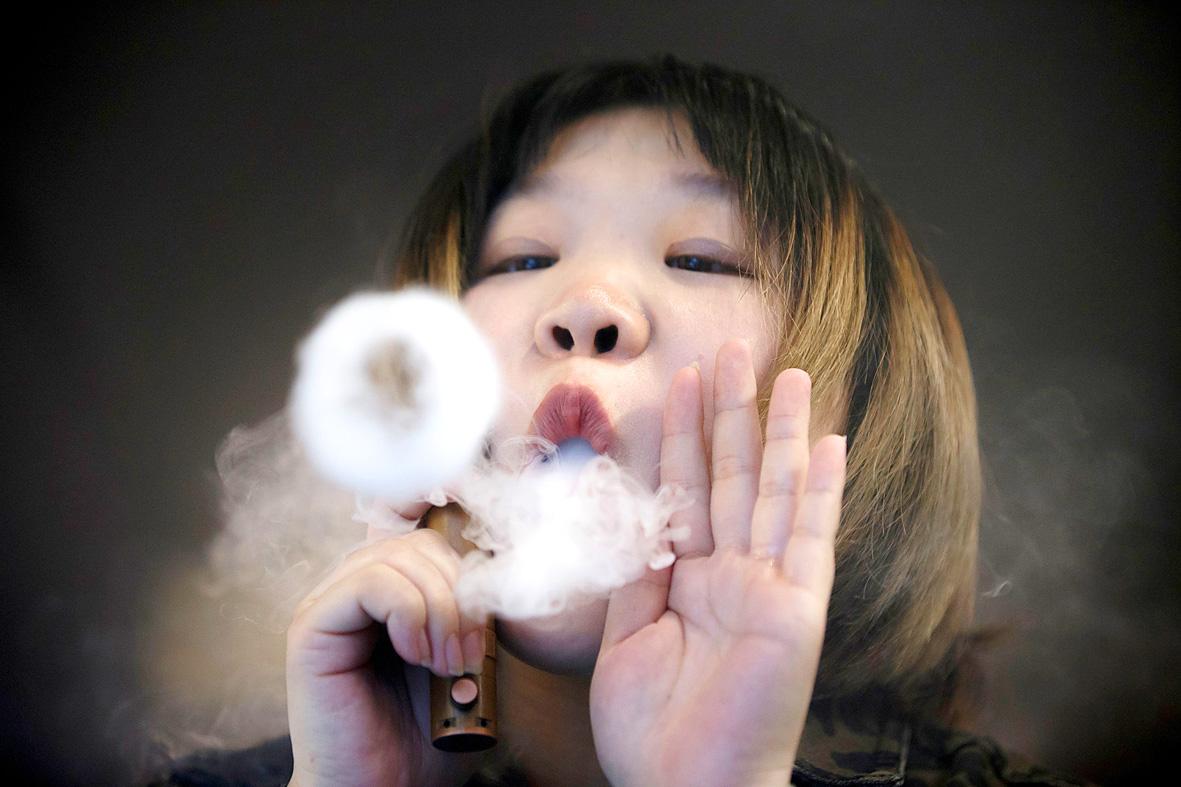China on Friday amended its tobacco monopoly law to include e-cigarettes, stepping up regulation of the fast-growing vaping industry in the world’s largest tobacco market.
The Cabinet order, published on the Chinese government’s Web site and signed off by Chinese Premier Li Keqiang (李克強), takes effect immediately.
A number of Chinese e-cigarette companies have been set up in the past few years to tap into domestic sales potential, among them market leader RLX Technology Inc (霧芯科技).

Photo: Reuters
Warning: Smoking can damage your health
RLX said on WeChat that it would heed the rules and make required changes.
Chinese regulators in March flagged plans to bring the rules governing the sale of e-cigarettes and other new tobacco products into line with those for ordinary cigarettes.
They had previously been in a regulatory gray area.
China’s tobacco industry is controlled entirely by a government monopoly, and strict controls determine which companies and retailers can produce and sell cigarettes.
The government outlawed the sale of e-cigarettes to minors in 2018 and banned online sales the following year, while Chinese state media have warned of the health and safety risks of using the products.
Separately, the Chinese State Administration for Market Regulation proposed new rules that would increase online advertising oversight, including stipulating that advertisements should not affect normal Internet use or mislead users.
This year, Chinese authorities have tightened regulation across a range of industries, with an emphasis on technology.
Internet advertising must “meet the requirements for the establishment of socialist spiritual civilization and the promotion of excellent traditional culture of the Chinese nation,” the agency said.
The proposed rules call on platforms to establish a system for registering and reviewing advertisers and adverts, and “monitor and inspect the content of advertisements displayed and published by using its information services.”
The proposed rules also call for bans on advertisements aimed at minors promoting medical treatments, cosmetics and online games “that are not conducive to the physical and mental health of minors.”
The proposed rules are open for public comment until Dec. 25, the agency said on its Web site.
Search giant Baidu Inc (百度) and game publisher Tencent Holdings Ltd (騰訊) said in their quarterly results that the short-term outlook for advertising sales looked weak due to fallout from the COVID-19 pandemic and China’s regulatory crackdown.

MULTIFACETED: A task force has analyzed possible scenarios and created responses to assist domestic industries in dealing with US tariffs, the economics minister said The Executive Yuan is tomorrow to announce countermeasures to US President Donald Trump’s planned reciprocal tariffs, although the details of the plan would not be made public until Monday next week, Minister of Economic Affairs J.W. Kuo (郭智輝) said yesterday. The Cabinet established an economic and trade task force in November last year to deal with US trade and tariff related issues, Kuo told reporters outside the legislature in Taipei. The task force has been analyzing and evaluating all kinds of scenarios to identify suitable responses and determine how best to assist domestic industries in managing the effects of Trump’s tariffs, he

TIGHT-LIPPED: UMC said it had no merger plans at the moment, after Nikkei Asia reported that the firm and GlobalFoundries were considering restarting merger talks United Microelectronics Corp (UMC, 聯電), the world’s No. 4 contract chipmaker, yesterday launched a new US$5 billion 12-inch chip factory in Singapore as part of its latest effort to diversify its manufacturing footprint amid growing geopolitical risks. The new factory, adjacent to UMC’s existing Singapore fab in the Pasir Res Wafer Fab Park, is scheduled to enter volume production next year, utilizing mature 22-nanometer and 28-nanometer process technologies, UMC said in a statement. The company plans to invest US$5 billion during the first phase of the new fab, which would have an installed capacity of 30,000 12-inch wafers per month, it said. The

Taiwan’s official purchasing managers’ index (PMI) last month rose 0.2 percentage points to 54.2, in a second consecutive month of expansion, thanks to front-loading demand intended to avoid potential US tariff hikes, the Chung-Hua Institution for Economic Research (CIER, 中華經濟研究院) said yesterday. While short-term demand appeared robust, uncertainties rose due to US President Donald Trump’s unpredictable trade policy, CIER president Lien Hsien-ming (連賢明) told a news conference in Taipei. Taiwan’s economy this year would be characterized by high-level fluctuations and the volatility would be wilder than most expect, Lien said Demand for electronics, particularly semiconductors, continues to benefit from US technology giants’ effort

‘SWASTICAR’: Tesla CEO Elon Musk’s close association with Donald Trump has prompted opponents to brand him a ‘Nazi’ and resulted in a dramatic drop in sales Demonstrators descended on Tesla Inc dealerships across the US, and in Europe and Canada on Saturday to protest company chief Elon Musk, who has amassed extraordinary power as a top adviser to US President Donald Trump. Waving signs with messages such as “Musk is stealing our money” and “Reclaim our country,” the protests largely took place peacefully following fiery episodes of vandalism on Tesla vehicles, dealerships and other facilities in recent weeks that US officials have denounced as terrorism. Hundreds rallied on Saturday outside the Tesla dealership in Manhattan. Some blasted Musk, the world’s richest man, while others demanded the shuttering of his